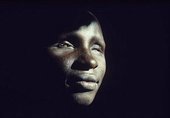
Matthew 9, 27-31: The Two Blind Men
Blindness is a distressingly common disease, and those who are afflicted plead for healing. The Gospel tells us that their hope hinges on Jesus. Verse 18 of the first reading tells us that the day will come when the blind shall see and the deaf shall hear.
But not all those who are blind want healing. After all, begging is an easier way to eke out a living. Or, we hear on television stories of many prisoners who would intentionally commit crimes in order to be brought back to prison. Being in prison has advantages: food is provided. There are many people who in the depth of their hearts do not dislike their weaknesses. They do not wish to lose their sins especially if they derive pleasure and comfort from them. For those who are involved in graft and corruption, they do not actually wish for its abolition. Alcoholics and drug addicts do not wish for freedom from these addictive substances. Many people do not desire healing. Or else, the very source of their relief and enjoyment vanishes. Thus, Jesus did not answer their shouts at once. Jesus wished to be sure that they were sincere and earnest in their desire to be healed. Jesus wanted to be sure that their request was genuine and that their sense of need was real.
Advent is a season of healing and growth. It is a time when we bring to God our wounds and illnesses, and sincerely plead for healing. It is a time when we should take a moment to think about what we need to bring to Jesus for healing; to identify our pain and wounds; and to accept the fact of our blindness and brokenness. St. Ignatius in the Spiritual Exercises recommends that we should be clear with the desire we request of God and that the grace being asked is articulated. Are we sincere and genuine enough to desire healing? What would we say to Jesus if He asks us what we need?
Second, it is interesting to note that Jesus answered their desire, not in the streets, but when they have come to him in the house. You see, it is only when we are faced with ourselves and when we are alone with Jesus that we are able to be honest with ourselves. It is when we are alone that our wounds stare at us closely. We can hide our wounds and dark secrets from a crowd; we can make promises to God like an avid fan for all to hear; and often we shout to everyone what they would like to hear, so that they will appreciate us. We can loudly claim our commitment to Christ in the middle of a spiritual whirl and when we are emotionally charged like many who went into the Days With The Lord, or a charismatic fellowship, or a retreat that employs letters from parents and significant people to highlight affirmation as an experience of God’s love. But what matters is what happens when the crowd is gone, when the emotional high has dipped, and when we return alone to the privacy of our rooms, if not our existential isolation.
The description of ‘character’ by Billy Hybell is interesting. He defines character as who we are when we are alone with God; who we are when no one’s looking. It is easy to become a disciple in an applauding crowd. Jesus compelled these two blind men to face him alone and discern their desire. There he asked them, “Do you really believe?" A wound or any disease like blindness can consolidate and reveal our true character, our true self, our real home. Our wound can thus bring us to who we are, to that inner home which we yearn for. And thus healing happens in the passage of time, when we face ourselves squarely and answer truthfully the questions raised by our wounds. It is an opportunity to get to know our true self. Carl Jung said, “if you get rid of the pain before you have answered its questions, you get rid of the self along with it.”
Advent is the time for self-awareness, and for answering the questions of our sickness, our pain, and our brokenness. What are the areas in our life to which we are blind? Has our enthusiasm to work for God waned? What contributed to our disappointment and the diminishing interest in our work or in life in general? Why are we apathetic to realities of poverty and injustice around us? Is there a relationship that needs restoration? Although many truths in our lives are painful to accept, the very awareness of these wounds helps us to see our true selves. When our eyes are once opened to the truth of our lives, healing happens. Growth occurs.

No comments:
Post a Comment